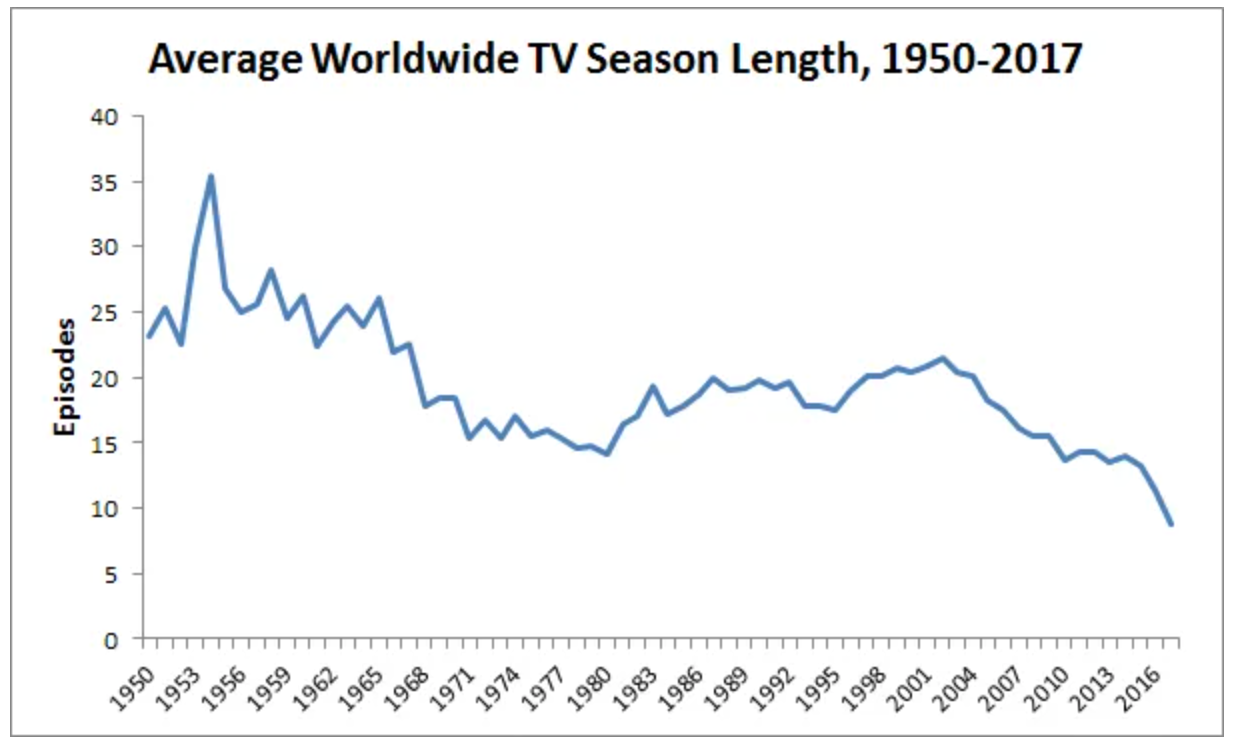Think about the show that you most recently watched. Now, try to remember how many episodes were in that season. If it came out within the last 10 years, there’s a good likelihood it has 10 episodes or less. If it came out more than 10-15 years ago, there’s an equally good chance it has more than 10 episodes, and even more likely, 22 episodes.
While searching for a new TV show to start, I noticed one key element that set current shows apart from decades old shows: the number of episodes per season.
I set out to find why the average number of episodes have gone down in recent years.
Here’s what I found out.
The downsizing of episodes per season isn’t something new. When TV first started, scripted shows usually ran for entire year, with a brief hiatus during the summer. As competition for airtime increased, episode totals gradually trailed off. This decrease began with cable, then spread to network TV, then eventually to streaming platforms.

Based on worldwide TV data from The Movie Database (also known as TMDb). From the ringer.com, Mourning the Loss of the Long TV Season.
Now, there’s a few exceptions to shows having a reduced number of episodes to a single season. Most network television content still abides the 22-episode season, these are the medical dramas, police procedural, and typical 30-minute comedy shows – think Grey’s Anatomy, Law & Order: Special Victims Unit, and The Big Bang Theory respectively. While there is still a time and place for longer seasons, most shows no longer follow that particular pattern.
Shows that premiered 15+ years ago relied heavily on syndication (when a television program is shown or repeated on a different network than the one it originally aired on. The number for syndication is generally between 90-100 episodes). They also relied on selling ads during commercial breaks. With the rise of steaming, most platforms no longer need to rely on selling ads, studios can now begin monetizing shows almost immediately. The streaming platforms want more subscribers, not syndication, since most platform generated programming will stay on the platform.
Streaming also allows for the audience to binge watch an entire season, or even multiple seasons, in a single setting.
Which leads to the next point, seasons now have a more focused narrative.
Instead of having to carry multiple or a single plot-line across a 22-episode season, having a shorter episode constraint creates rich and high-intensity episodes, with no fluff or filler needed to limit how much character or story development takes place in a single episode. Story and character arcs are now more realistic and attainable – shorter seasons eliminate the need of stringing them along for an indefinite length.
(A brief sidenote: this might be regarded as an unpopular opinion, but I rather enjoy filler episodes. A filler episode is defined as an episode that is unrelated to the main plot, that doesn’t significantly alter any relationships between the main character, and is designed to “fill the space” in a season. In filler episodes, there’s an opportunity to see characters and worlds further developed and fleshed out, or a more dramatic show explore more comedic elements.)
In the world of constant media, one way to gain attraction to a show is star power. Stars no longer want to be tied down to a 22-episode season with the chances of being renewed for multiple seasons. Shorter seasons allow the actors, and crew, more flexibility to take on other work. Having a more manageable number of episodes also prevents cast and crew from burnout, with shows requiring long days, frequent evening shoots, and fast script or edit turnarounds – all which directly ties back into having a focused, planned story line.
When it comes right down to it, shorter seasons for television shows can be surmised with this: quality over quantity.




Hi Kristin!
I love this article and your conclusion that the focus is quality over quantity. I agree with the points you brought up. Heavy competition and streaming have completely revolutionized tv programing from what it used to be. How many new shows are able to turn out multiple episodes a season at the level of quality we have come to expect from hour long episodes of highly binged shows. It is beneficial to both viewers and actors alike with better programming and shorter shooting schedules which have made it more desirable for movie actors to venture into television.
I’ve always preferred the British model of a short “series” of eight to ten episodes that are well written and produced. The show LOST made the switch to a shorter season during a writers’ strike, and continued with shorter seasons until the show ended. The producers had a number of reasons – one was episode quality, but the other was since this was such a serialized show, they really couldn’t do reruns during the season. If they wanted a show every week till the season was over, they have to have shorter seasons.
I’m a big fan of the BBC’s Father Brown Mysteries that typically have about 10 episodes per season. And my favorite show in recent years has been the German Babylon Berlin that also runs very short seasons.
I recognize that this is hard on the writers and staff for the show having a short season, but I think it makes for much better television.
Thanks for a great post.
Kristen: I really enjoyed reading this post! I have noticed the decline in series episodes over the years, and it was really interesting to learn the facts behind why this has been happening. I didn’t even know what the word ‘syndication’ meant before reading this, so I was happy to learn that. To me, you had a good commentary/statistics ratio. This was easy to read but kept me interested because of the honest commentary. Although I miss long-winded series with 20ish episodes each, I do agree that fewer episodes offer a more focused plotline. In addition to that, I do like filler episodes once in a while but cannot stand when a season is half actual episodes and half meaningless fluff (or worse-recaps). My only suggestion would be to mention some of the most popular series right now and examine if they follow this trend too (just because I’m curious). But seriously, loved reading this!